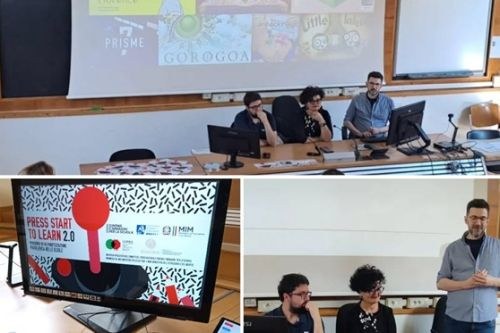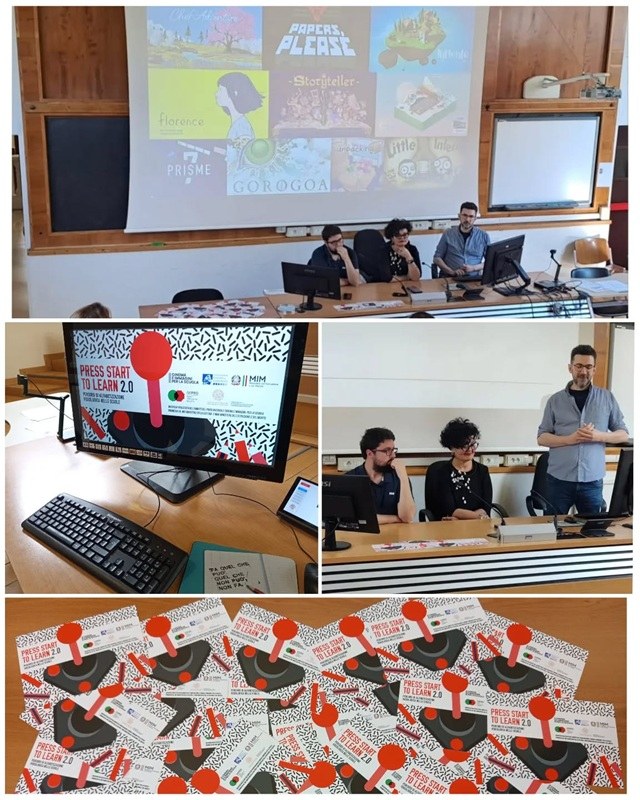One-third of Italians aged 6–64 (about 14 million) play videogames. So why not bring videogames into schools and turn them into educational tools instead of leaving them outside, subject to prejudice and stereotypes?
Press Start to Learn 2.0! is an experimental project aimed at videogame literacy, transforming games into tools for learning, critical thinking, and expression. Coordinated by IVIPRO – Italian Videogame Program, in partnership with the Department of Education Sciences “Giovanni Maria Bertin” at the University of Bologna, and funded by the National Cinema and School Images Plan (MiC‐MIM), the programme involved nearly 200 students and 35 teachers from four high schools across Emilia Romagna, Tuscany, and Lombardy.
Now in its second edition, the initiative tackled two main goals: first, to help young people use videogames consciously and critically; second, to provide teachers with concrete tools to integrate games into their teaching, complementing traditional methods with new digital media in a media education framework.
Survey results at the end showed that 58 % of students reported a change in their views toward videogames, recognizing their educational potential, while 79 % of teachers said they intended to use videogames in their teaching in the future.
During classroom game labs, titles like Papers, Please (a simulation set in a totalitarian state), Italy. Land of Wonders (created by MAECI to promote Italian culture), and Florence (a graphic-novel-style game exploring intense emotions and societal expectations around gender identity) were explored. Gameplay sparked rich discussions and critical engagement.
“We rediscovered videogames as a space for collective reflection, allowing us to address current cultural and ethical issues that textbooks struggle to include in school curricula: from ethics to citizenship, to information and the environment,” explains Rosy Nardone, professor of Special Education and Pedagogy at the University of Bologna, who coordinated the project.
Even typically introverted students voiced their insights. One student, usually reserved, remarked after playing Papers, Please: “Maybe the real threat to the state isn’t terrorism, but the absence of freedom of thought.”
The project moved beyond theory: each class developed a Game Design Document, a professional proposal for a videogame set in Italy, focusing on themes such as environment, equal opportunities, memory, and identity. The result? Feminist RPGs, ecological horror games, and narrative-puzzle experiences centred on memory and identity.
“In an interview, Italian historian and public intellectual Alessandro Barbero said books are wonderful because they let us live other lives. I believe videogames do the same: they let us live other lives, discover, care, and learn,” said one student at the programme’s conclusion.
Press Start to Learn 2.0! also introduced students to videogame-related careers—such as game design, programming, art, and sound design. —offering a concrete pathway to creative professions often absent from traditional curricula.
Teachers participated in dedicated training sessions. Initial resistance—based on cultural bias or personal experiences—gave way to critical, constructive dialogue, particularly in comparing videogames and social media.
“We can harness technologies—so long as we use them consciously. Videogames are part of our era. It's foolish not to exploit them,” one teacher noted at the programme’s end.
The eight-month project involved nine classes from upper secondary schools, with students aged 15 to 18, from: I.I.S. Bassi-Burgatti (Cento, Ferrara); Istituto Tecnico e Professionale Luigi Bucci (Faenza, Ravenna); Liceo Artistico Duccio Di Buoninsegna (Siena); Liceo Artistico Vincenzo Foppa (Brescia).
The scientific coordination and teaching activities were led by Andrea Dresseno and Stefano Caselli (IVIPRO) and Rosy Nardone (University of Bologna).
You can consult the final report of Press Start to Learn 2.0! here: https://ivipro.it/it/press-start-to-learn-2-0/.


